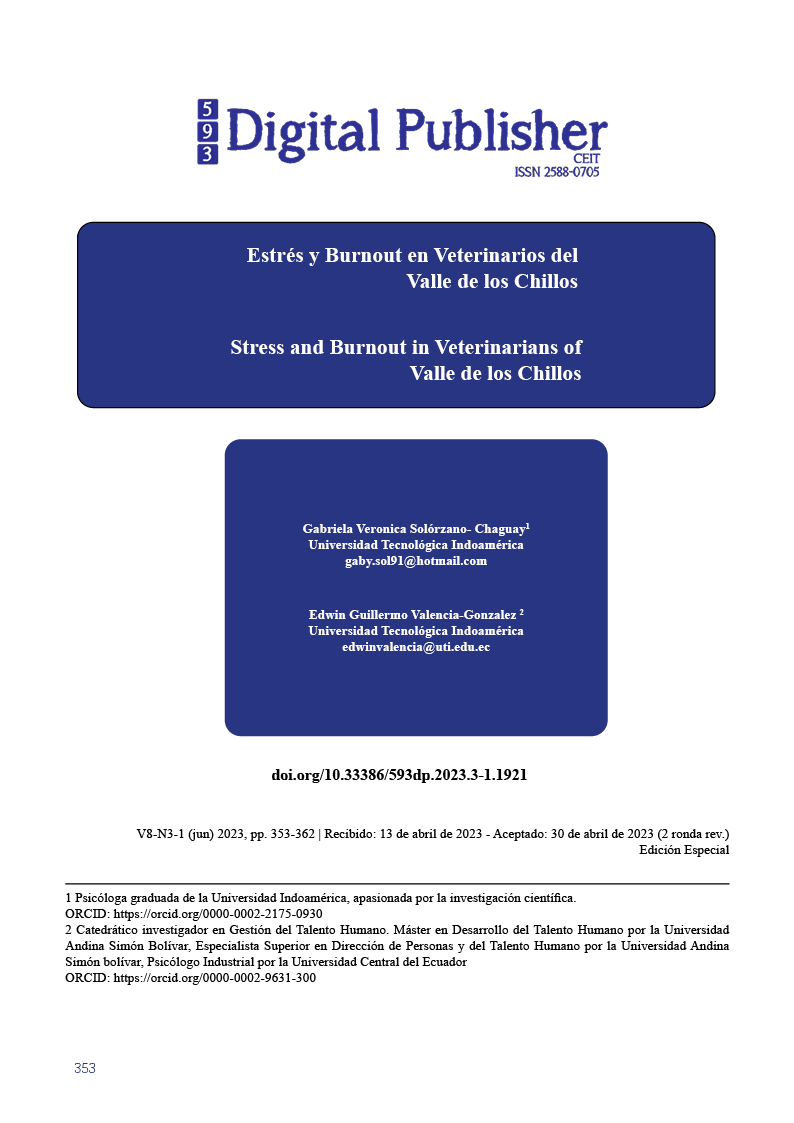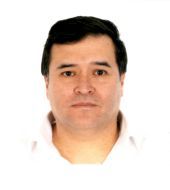Stress and burnout in veterinarians of Valle de los Chillos
Main Article Content
Abstract
The veterinarian is exposed to a number of factors in their daily work that can deteriorate their mental and emotional health. The objective of this research was to evaluate stress and burnout through the application of two questionnaires: Test "Maslach Burnout Inventory" and Test "Perceived Stress Scale", and determine the stress factors in veterinarians who practice their profession in the Valle de los Chillos in the city of Quito.
The results found in the Maslach Burnout Inventory (MBI) Test performed on Veterinarians working in the city of Quito in the Valley of the Chillos, show the relationship between the different variables studied (gender and age) and emotional fatigue. Che distribution of positive cases (signs of Burnout Syndrome) were 52% positive.
More than half of the respondents presented signs of Burnout Syndrome which suggests a greater tendency to emotional fatigue and depersonalization.
Downloads
Article Details

This work is licensed under a Creative Commons Attribution-NonCommercial-ShareAlike 4.0 International License.
1. Derechos de autor
Las obras que se publican en 593 Digital Publisher CEIT están sujetas a los siguientes términos:
1.1. 593 Digital Publisher CEIT, conserva los derechos patrimoniales (copyright) de las obras publicadas, favorece y permite la reutilización de las mismas bajo la licencia Licencia Creative Commons 4.0 de Reconocimiento-NoComercial-CompartirIgual 4.0, por lo cual se pueden copiar, usar, difundir, transmitir y exponer públicamente, siempre que:
1.1.a. Se cite la autoría y fuente original de su publicación (revista, editorial, URL).
1.1.b. No se usen para fines comerciales u onerosos.
1.1.c. Se mencione la existencia y especificaciones de esta licencia de uso.
References
Arcila, R. (2019). La precariedad laboral en el ejercicio profesional del médico veterinario en Colombia. Biblioteca Central "Vicerrector Ricardo A. Podestá", 4.
Chigerwe, M. (2014). Assessment of Burnout in veterinary medical students using the Maslach Burnout Inventory Educational Survey: a survey during two semesters. BMC Medical Education, 1-7.
Cornell, K. (2011). Faculty Expectations of Veterinary Students in Clinical Rotations. Journal of Veterinary Medical Education, 11-13.
Cruzado, L., Núñez, N., & Rojas., G. (2013). Despersonalización: más que síntoma, un síndrome. Neuropsiquiatr, 120-125.
Fuchs, S. (2018). Mental Health, Practice-Related Stressors, and Job Satisfaction of Veterinary Technicians in Nevada. Scielo, 5.
Gutiérrez, A. (2014). Riesgos Psicosociales y Estrés en el ambiente laboral. Salud Uninorte, 5.
Hatch, P., et al. (2011). Workplace stress,mental health, and burnout of veterinarians in Australia. Aust Vet., 89.
Koscinczuk, P. (2014). Ambiente, adaptación y estrés. Scielo, 3.
Leighton., S. & Dogra. N. (2008). Defining mental health and illness. 9.
Martínez, A. (2010). El síndrome de burnout. Evolución conceptual y estado actual de la cuestión. Vivat Academia, 112.
Osorio, J. (2017). Estrés laboral: estudio de revisión. Diversitas, 81-90.
Oxley, & Montrose&Kogan. (2017). E-mental health and the veterinary profession. Journal of the American Veterinary Medical Association., 250.
Rafati, F. (2021). Development and psychometric testing of nursing students’ perceptions of clinical stressors scale: an instrument design study. BMC Psychiatry, 1-10.
Ruvalcaba, Uribe, & Guitierrez. (2011). Identidad e identidad profesional: acercamiento conceptual e investigación contemporánea. Revista CES Psicología., 82-102.
Tabares, N. N. (2019). Estudio sobre el cansancio emocional y el síndrome de burnout en veterinarios. Argos, 16-18.
Valenecia, E., Correa, D., & Pazmiño, V. (2021). Síndrome de Burnout en personal de salud que brinda atención a pacientes con COVID-19. Revista Scientific, 144-166.
Vinten, C. (2020). Making the transition to practice: building competence,confidence and trust. The Veterinary Record, 213-215.
Weinborn, R. (2019). Burnout syndrome prevalence in veterinarians working in Chile. Austral Journal of Veterinary Sciences, 91-99.




